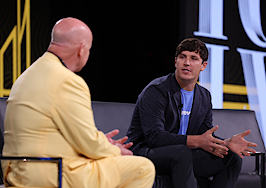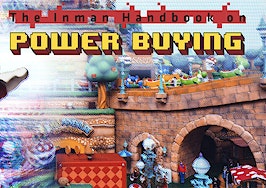Tim Heyl is something of a renaissance man.
More than a decade ago, Heyl was searching for a job and found himself falling into a career as a real estate agent with Keller Williams. It wasn’t his first choice of jobs, but after a rocky few months he soon found he was good at it. Not long after, he had an assistant. Then two. Then he was leading a team of multiple agents and dominating his local market in Austin, Texas. Today, the team still exists, has expanded repeatedly and includes more than 100 people.
Heyl’s rise has been remarkable and places him in an elite category of successful industry team leaders. If that’s where Heyl had stopped, he could sit back and enjoy a job well done.
But that isn’t all Heyl has done.
Instead, he founded a power buying startup dubbed Homeward. The company formed out of Heyl’s experiences as an agent, and launched in 2018. Today, among other things, the company provides cash backing to buyers so their offers can be more competitive and so they have the option of buying before selling their previous residence.
Homeward entered a crowded real estate technology space when it launched, but has nevertheless managed to stand out. In May, the startup secured $371 million in new funding. More recently, in November, Homeward embarked on a 20-market expansion. The company is consequently notable for its growth, for its place on the vanguard of the power buying trend and for its (and Heyl’s) emphasis on working with agents rather than against them.
Back in October, at the conclusion of Inman Connect Las Vegas, Heyl’s work earned him Inman’s Innovator of the Year award. Now, as 2021 wraps up, Inman has also chosen Heyl as Person of the Year thanks to his ability not only to innovate, but also to walk the line between the technology world and the realm of traditional real estate. He manages to have a foot in both spaces, which increasingly captures where the broader industry is headed.
To understand how Heyl juggles his different roles, Inman recently sat down with him to talk about his career and the real estate business. What follows is a version of that conversation that has been edited for length and clarity.
Inman: Give me a quick run down of how you started in the real estate industry. How did you begin your career?
Heyl: I became a real estate agent in 2009. It was the very bottom of the real estate market and this was back when average days on market was like six months to a year for most listings. So it was a very different market compared to today. I was trying to get a different job. I was a finance major coming out of college and I was applying at banks.
But I couldn’t get one. I think I must have interviewed at 30 places. And I finally had gotten my real estate license and I decided to take a crack at going all in selling houses. I had Gary Keller’s The Millionaire Real Estate Agent book about how to build a real estate team and got really excited about the entrepreneurial opportunity in being a real estate agent.
So from day one, that sort of entrepreneurial bug, I think it bit me with the reading of that book.
I spent the first six to nine months doing what most new agents do. Kind of fumbling around the office, being busy but not getting deals done and not making much money.
I finally went to a kind of sales boot camp where I learned how to go find people who need to move. And the rest is kind of history. I started making phone calls on expired listings, for-sale-by-owners, and just going to meeting with them. I ultimately got fairly good at it. I became the number one real estate agent in my market when I was 24, in Austin, Texas.
I focused first primarily on homeowners, on sellers, and eventually I built out a real estate team with tons of buyer agents and expanded that team to many different cities. That team still exists today, it’s called the Heyl Group. It’s a little over 100 agents that do about $1 billion in volume.

Tim Heyl (right) speaks with Brad Inman at Inman Connect Las Vegas in October. Credit: AJ Canaria of MoxiWorks
You chose to start out at Keller Williams. What about the company appealed to you?
I read Gary’s book and I realized that there’s a real entrepreneurial opportunity in being a real estate agent. And this guy, Gary Keller, had figured it out. I read the book and realized he broke it down and made it simple. I had never built a business before. I had never had a sales job before. But I read his book and felt like wow, this is a really clear cut map for how to do this and I want to continue to follow the person who put this together.
Let me pivot here. You’re a successful agent. You lead a big team. You have a lot on your plate. For a lot of people in real estate, they’re tapped out when they get to that point. But in your case, you decided to start a new company, Homeward. Talk to me about why and how you did that?
As I was continuing to expand the Heyl Group, I ran into lots of different challenges. One was from a customer level, my agents and I would go and meet with customers all the time that had kind of the same set of problems coming up over and over again. They’d say, “we want to move, but we don’t want to list our house until we know where we’re living next. And we don’t want to go and shop for homes because if we find one we like we’re not in a position to make an offer on it. So we feel stuck.”
Another thing is that as a real estate business owner I was constantly focused on how do we, as a company, separate ourselves from this sort of sea of sameness.
And there’s one more thing, and that’s that I saw tons and tons of venture capital coming into the real estate industry and backing businesses that were not from real estate, that didn’t understand real estate agents. They didn’t necessarily understand the homebuyer and the homeseller the way that great real estate agents do. And they were being backed with millions and millions of dollars in capital to go build businesses that actually were pointed right at displacing real estate agents — the role that I was in and that all my friends were in. And I just felt like they had it all wrong.
The real estate agent is not the problem with homebuying. The way that the process has been set up with fragmented point solutions, and just the whole process in itself, is flawed. It’s not any one role, definitely not the real estate agent at fault. So I wanted to represent real estate agents to solve this problem and partner with agents to go solve the problems that make homebuying stressful.
We want to force ourselves to win that opportunity. Some of the ways we do that are bringing the cost to the consumer down. I think Zillow reported that people who are buying and selling pay on average 11 percent in fees. So if you’re selling a $300,000 house and buying a $500,000 house, can you imagine paying over $50,000 just to make that move? The cost is really high.
Historically, venture backed companies have said, “hey half of that is going to the real estate agent. Let’s go cut it out of that.”
What Homeward has done is take a different approach. We said we also believe the cost to the consumer is too high, but that doesn’t mean it needs to come out of the agent’s pocket. There’s a lot of money exchanging hands here. And what we’ve done is we’ve said, “what if the other service providers were able to bring down their fees. What if the other half of the 6 percent was able to come down.”
What we’ve learned is you can do that. There’s a lot of money moving around, there’s a lot of redundancies. Our goal is just to create a more integrated, flexible experience across the board.

Tim Heyl at Inman Connect Las Vegas in October. Credit: AJ Canaria of MoxiWorks
You mentioned how you saw a lot of venture capital coming into real estate. But your background is not in that world. You’re an agent and team leader. How did your unique background in real estate inform the process of building a tech startup?
I’ve partnered with a lot of the Silicon Valley-backed companies as a real estate agent and as a real estate team. I saw a lot of what they were doing well and a lot of what they weren’t doing well. What they were doing well was creating a brand, marketing themselves, raising capital.
But one of the things I noticed some not doing as well was they would jump in and start building technology right off the bat, as if the product was technology. I think one of the things that has really helped Homeward is we’ve taken an industry perspective. I personally have helped thousands of homebuyers and sellers to make their moves. And I have managed teams of real estate agents who have helped tens of thousands manage their moves. And I think those experiences have given us perspective and context around the problems that exist.
We were also really patient around building technology. We were really patient around what we would be building and why we would build it. We put a lot of pressure on understanding the perspective that homebuyers and sellers and real estate agents have, before we went out and built anything. And I think that patience and that level of understanding went a really, really long way.
Not to say we haven’t had our own fumbles and challenges, because we certainly have. But I would say Homeward has been on a fast path because we skipped a lot of the pitfalls facing people who don’t understand homebuyers, homeowners, and selling. This is is not the most intuitive of industries. And I think having that background and perspective really went a long way to creating that foundation early on.

Brad Inman, left, with Tim Heyl at Inman Connect Las Vegas in October. Credit: AJ Canaria of MoxiWorks
Talk to me more about that future. You guys are in the power buying space and I’m curious how big this trend can get.
What we think of as power buyers today, it’s kind of a simple view of helping a homebuyer make a cash offer. But that’s just the beginning. We’ve barely tapped into what is possible.
I think with Opendoor and the iBuyer craze we saw what’s possible when a company becomes the person who buys the home and owns the home and resells the home. When a company is on a side of that transaction, you can do really cool things like self tours.
Right now, the way that people buy homes is they get underwritten for a mortgage and whatever they’re able to qualify for based on the assets and the income and the credit that they have, that’s what they get.
But I believe that for as many people as use a mortgage to buy a home today, that same percentage of people will in the future use alternative solutions. Maybe some of it includes the mortgage, maybe some of it is in place of a mortgage. But there’s going to be all kinds of opportunities for alternative financing to solve the problem.
It goes back to three things: Income, credit and access to cash. And so some of those problems are credit. If you have bad credit, you can’t get a mortgage. If you can’t get a mortgage it’s next to impossible to buy and own a home. But there are many people with no credit or bad credit who could buy a home and I believe in a future where they will be able to buy a home with alternative solutions.
Credit is just one. Many teachers cannot afford to live in the school district they teach in. You can’t build community where you work because it’s unaffordable to live where you work unless you choose to rent. So there’s a mismatch here and you’re starting to see opportunities to own homes that exceed your level of mortgage affordability in more mainstream ways.
Another thing that Homeward has really focused on is access to cash. We’ve provided short-term access to cash.
But there’s also longer term access to cash. For example, I have family members who graduated from school, and what they do is they immediately start throwing away their money on rent because they don’t have years of savings to put toward a downpayment. And without downpayment funds, in today’s world it’s next to impossible to own a home.
In the future, I believe that’s going to change and there’s going to be solutions that provide longer term access to cash for those who want to get into the homeownership game sooner.
As you can see these are just some problems and some solutions. But over time, I believe that a whole new set of financing will become available to people who want to buy homes and own homes and participate in the home ownership game. And we’re just barely seeing the start of that. It’s not slowing down. We’ve seen that Wall Street and Silicon Valley have invested more every year than the year before and it’s accelerating more every year. That trend is on the rise.
We’re starting to see other industries where a dream has become a reality. So, pressing a button on a phone and having somebody come pick you up and take you wherever you want to go. Fifteen or 20 years ago, that might have seemed like an absolute dream. But it’s a total reality today.
What’s really cool is that 10, 15 years from now what seems like an absolute dream is going to be a reality in homebuying, and I am personally really excited about that.









